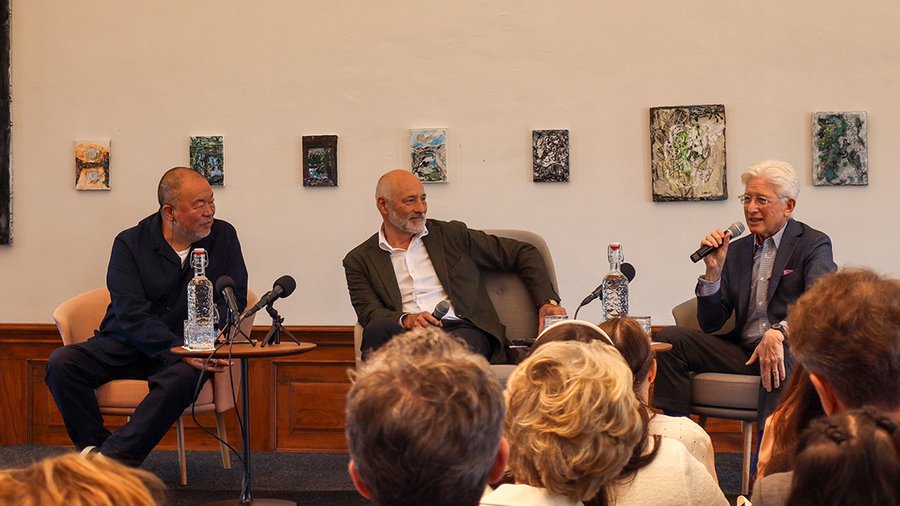A thought-provoking panel discussion with renowned Chinese artist Ai Weiwei on how activism through art sheds light on contemporary issues
Martin Weiss, President and CEO of Salzburg Global Seminar, opened an engaging conversation with renowned Chinese artist and activist Ai Weiwei with a profound statement: “You are shaped by your life’s experiences”. This remark set the tone for a thought-provoking discussion with Ai Weiwei, and the director of the Jewish Museum in New York, James S. Snyder.
As highlighted throughout the conversation, Weiwei’s artistic work often addresses issues related to human rights, freedom of speech, and the relationship between an individual and the state. His work spans a range of artistic mediums, with some famous works including the documentary “Human Flow” as well as the installations “Sunflower Seeds”, “Remembering”, and “Trace”.
For Weiwei, art became a powerful medium to convey important social and political messages. He continues to use his creativity to champion freedom and human rights, making a significant contribution to cultural activism.
Weiwei explained the influence that his humble upbringing in a remote area of China continues to have on his life and artwork. He recalled that while his father was forced to clean public toilets and carry out other menial jobs after being exiled, it inspired Weiwei to become who he is today. Showing the audience his phone wallpaper, he explained that the image featuring a black hole at its center symbolizes the profound impact that his upbringing continues to have on his life and work.
Weiwei shared that, “My father once wrote a sentence in Chinese that has remained with me to this day: ‘The home is where you put your leg.’ This phrase underscores the necessity of adapting and accepting one's circumstances when settling or migrating. Make extra effort to adapt.”
Through his experiences moving from China to the United States and later to England, Germany, and Portugal, Weiwei admitted that “I have never felt at home”. He believes that “home is about memories and familiarity, something you feel attached to, but I have never had that”. As a political refugee himself, Weiwei’s statement sheds light on one of the most pressing humanitarian issues of our time, global refugee migration.
James S. Snyder enthusiastically praised Weiwei’s remarkable work, highlighting one of his documentaries, “Human Flow”, which addresses the crisis of global refugee migration. One poignant segment of the documentary takes place in Gaza, where Weiwei interviewed a group of girls graduating from high school who, despite their circumstances, could not leave their home. He asked them, “Do you wish to leave this place?”, to which they responded, “We want to travel the world, but we want to come back here because this is our home.” By showing scenes like this in his art, Weiwei sheds a powerful light on the experiences of marginalized and displaced people worldwide.
In an era of widespread global migration, "the notion that exile is home” is becoming increasingly common, James explained. He elaborated on Weiwei’s dedication and personality, describing how the artist has travelled globally to document the experiences of refugees. Weiwei further revealed, “I visited twenty-three countries and the forty largest refugee camps, where I conducted 1,500 interviews with refugees from places like Bangladesh, Syria, and Jordan. Some of them were bombed and forcibly removed from their homes.” By amplifying the voices of people who are often overlooked, Weiwei's work is a testament of courage, compassion, and unwavering commitment to human rights.
Ai Weiwei exemplifies how art can go beyond aesthetic expression to profoundly impact global humanitarianism; it can highlight crises like migration and displacement and advocate for a more inclusive future. Weiwei’s insights also serve as a powerful reminder that our past can influence how we perceive our present and future, as he shared that “If you change yourself, then you have changed the world". His commitment to justice and truth in his art calls for a collective responsibility to uphold human rights and address these challenges with empathy and action.
This event was organized under the auspices of Salzburg Global Seminar - Austria.


